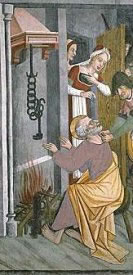Today we have a guest post by Brian Jenkins.
Linguistics is an intriguing subject to some college students, and many end up choosing it as a major. However, Kent Clizbe, a headhunter who specializes in recruiting linguists, offers this dispiriting advice: “I tell these students, ‘you did your dissertation specializing in Cherokee semantics. Great. Now get as much of a computer background as you can.'”
Associate’s, bachelors’s, master’s, and doctoral degrees and certifications are available on-campus and online. Most associate’s and bachelor’s degree programs offer career training for those who want to teach English as a Second Language (ESL). Those with a master’s or doctoral degree have wider career options. So yes, those with a linguistics degree are sought after in the job market.
What Can Linguists Do?
- Build databases to help e-commerce customers navigate the Internet
- Build natural language processing systems to improve customer service of Internet businesses
- Develop grammar checking functions for software
- Improve the quality of automated translation on the Internet
- Work for natural language processing firms
- Work on search engines, speech recognition, and artificial intelligence
- Work with language consultants to document, evaluate, and preserve languages
- Develop curricula and materials for education
- Work for the F.B.I., police departments, or the foreign service
- Work for product-naming companies
Careers for Linguists
Some of the occupations shown below require additional training:
- Computational linguists (combines linguistics and computer science and overlaps with the field of artificial intelligence)
- Lexicographers (compile, write and edit dictionaries)
- Vocabulary resource managers
- Speech therapists
- Translators
- Intelligence analysts or code breakers for the U.S. government
- Forensic linguistics (analyzing linguistic aspects of evidence, legal texts, voice identification issues, and other topics)
- English as a Second Language teachers
- College linguistics instructors
There are more than 200 linguistics programs across the country. The Linguistics Society of America provides an extensive list of schools that offer linguistics programs and other closely related areas of study.
Linguistics Bachelor’s Degree Program
These programs typically cover phonics, general linguistics, computational linguistics, English as a Second Language, and statistics. In order to improve the chances of getting a job some students choose a double major and have a secondary specialization in a subject such as computer science, psychology, education, the speech sciences, philosophy, foreign language, or journalism.
Linguistics Master’s Degree Program
These programs focus on research and provide the skills needed to teach language. Students typically specialize in a specific area, such psycholinguistics or phonology. Applicants for a master’s degree program are typically expected to be highly proficient in English, English composition and English as a Second Language. They also need a comprehensive knowledge of at least one foreign language.
Linguistics Doctoral Degree Program
Students seeking a doctoral degree need an in-depth understanding of advanced linguistics theory and computational linguistics. They’re usually required to speak and read fluently in several languages. A Ph.D is typically required to teach at colleges and universities.
Online Linguistics Degree program
Online linguistic students basically receive the same education students attending a traditional school. They can easily access lectures, texts, and audio and video recordings. Foreign language classes are typically part of an online linguistics program. There are numerous accredited online linguistic programs to choose from.
Many schools offer linguistics education programs. A linguistics degree, especially when combined with other training, qualifies graduates for an array of jobs within the field.
About the author
A member of BrainTrack’s writing staff, Brian Jenkins writes about careers in education, among other topics.



